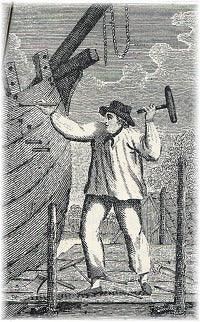Captain Wentworth Speaks on Matters Naval
"The Admiralty," he continued, "entertain themselves now and then, with sending a few hundred men to sea, in a ship not fit to be employed. But they have a great many to provide for; and among the thousands that may just as well go to the bottom as not, it is impossible for them to distinguish the very set who may be least missed." Captain Wentworth, Persuasion by Jane Austen
While this comment may cause readers to wonder whether Captain Wentworth is joking or whether the seaworthiness of British Naval vessels was actually in question, at this moment in time, 200 years distant from the author’s experiences, readers may simply scratch their heads and read on. After all, who wants to stop reading and research a single obscure quote.  As it happens, the disregard, which the Admiralty showed for the safety of the men under their command, was a topic of discussion in Jane Austen’s day. The deplorable situation prompted Captain Thomas Cochrane to run for Parliament. Once elected, as a reform candidate in 1807, he raised questions before Parliament about the manner in which the British Navy was being run, singling out Lord St Vincent, First Lord of the Admiralty, for allowing unchecked corruption within the British Navy. While John Jervis, fist Earl of St. Vincent, was not corrupt himself; he was a political animal, who knew better than to cross conservative forces within the government by ending age-old-privileges. St. Vincent’s most striking innovation was the first time use of cost effective assembly line production techniques for the carving of the thousands of wooden rigging blocks needed by the British Navy, at a facility built in Portsmouth Royal Dockyard. Corruption and skimming had long been considered perks of office, so long as they did not become egregious. Conservative forces within the British government wished to protect their right to line their pockets at government expense, while in office.
As it happens, the disregard, which the Admiralty showed for the safety of the men under their command, was a topic of discussion in Jane Austen’s day. The deplorable situation prompted Captain Thomas Cochrane to run for Parliament. Once elected, as a reform candidate in 1807, he raised questions before Parliament about the manner in which the British Navy was being run, singling out Lord St Vincent, First Lord of the Admiralty, for allowing unchecked corruption within the British Navy. While John Jervis, fist Earl of St. Vincent, was not corrupt himself; he was a political animal, who knew better than to cross conservative forces within the government by ending age-old-privileges. St. Vincent’s most striking innovation was the first time use of cost effective assembly line production techniques for the carving of the thousands of wooden rigging blocks needed by the British Navy, at a facility built in Portsmouth Royal Dockyard. Corruption and skimming had long been considered perks of office, so long as they did not become egregious. Conservative forces within the British government wished to protect their right to line their pockets at government expense, while in office.
Captain Cochrane, who was a respected and highly successful British Naval commander, had personal knowledge of the scandalously corrupt and inept management of the British fleet. He personally knew the captains of two vessels, which had recently sunk, resulting in the death of all aboard. The commanders of the HMS sloop Atalante and the schooner Felix had repeatedly written to the Admiralty, concerning the extremely unseaworthy state of their ships. Both ships had been refused permission to put into port for repairs. Captain Cochrane’s speeches in Parliament became the topic of newspaper articles and public discussion. Jane Austen may have read about these speeches in Parliament in The Times or may well have heard about the situation from her brothers Frank and Charles, who were in the Navy. However, conservative forces within the Navy and Parliament were so entrenched that, in the end, nothing was done about naval mismanagement.  Captain Cochrane’s attempts at reform were ended, by the simple expedient of ordering him back to sea. Jane, as is her custom, handles the serious subject with a light and witty touch that is never preachy or pedantic. The literary sister of two navy men has the parting shot with her discussion, indicting the Admiralty for their disregard for the safety of the men serving in the British Navy, set around a dinner table, among the families, to whom the men are dear.
Captain Cochrane’s attempts at reform were ended, by the simple expedient of ordering him back to sea. Jane, as is her custom, handles the serious subject with a light and witty touch that is never preachy or pedantic. The literary sister of two navy men has the parting shot with her discussion, indicting the Admiralty for their disregard for the safety of the men serving in the British Navy, set around a dinner table, among the families, to whom the men are dear.
Written for the Jane Austen Online Magazine Sharon Wagoner, Curator of The Georgian Index. Visit this site for a historical tour through Regency London!



Leave a comment
This site is protected by hCaptcha and the hCaptcha Privacy Policy and Terms of Service apply.